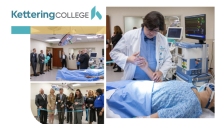Story by Rebecca Ingle
Kettering College recently held a ribbon-cutting ceremony to officially open the new nursing simulation lab, called Lab C. Various faculty and staff attended the ceremony as well as Kettering Health leadership and executive council to commemorate the special day.
Lab C was created to address a growing need for the nursing program. In the fall of 2022, Kettering College welcomed their first cohort of nursing students into the Accelerated Bachelor of Science in Nursing (A-BSN) track. Students can earn a Bachelor of Science in Nursing in 15 months in this accelerated, full-time program.
Based on curriculum developed for the A-BSN program, a third lab was created to best serve those students. Lab C consists of five patient rooms and was designed to mirror the layout of the other two existing labs. The lab is equipped to simulate nursing skills currently required in the nursing program in a dedicated space where nursing students can grow their skills safely.
Nursing students will be able to perform a head-to-toe physical assessment using high-fidelity manikins. They will learn to perform a wide range of skills, including insertion/ discontinuation and care of an indwelling urinary catheter, IV fluids, and other medication.
The simulation lab incorporates advanced technology to simulate real-life patient situations in alignment with National Patient Safety Standards. The goal is to mimic a professional health care setting as closely as possible to prepare students as they move into the workforce, building their confidence as they expand their comfort and knowledge.
As is the case with the other simulation labs at Kettering College, the nursing faculty observe students from a control room, rather than being bedside. This directs the students’ attention to the patient rather than the instructor. Nursing faculty have noted that by putting students together, they start to understand what they need to do with each other and the patient. Learning becomes more collaborative instead of automatically looking to the faculty immediately for the answers.
Dr. Paula Reams, dean of Nursing, said, “Thank you to all that made this happen. Our A-BSN students will benefit from this space now and for many years to come. Having safe spaces to learn how to care for patients through simulation makes the transition to bedside nursing easier for the student. These new spaces for laboratory learning can be and will be used not only for nursing but for all health care professional students.”

